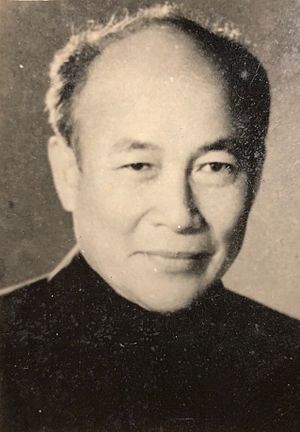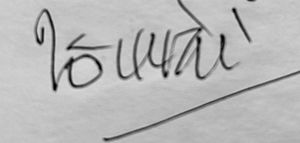Tô Hoài facts for kids
Tô Hoài (born Nguyễn Sen; September 27, 1920 – July 6, 2014) was a very famous Vietnamese writer. He also wrote plays, movie scripts, and worked as a journalist. His pen name, Tô Hoài, came from the names of a river and a province near his hometown. Some of his most popular books include Dế mèn phiêu lưu ký (Diary of a Cricket) from 1941, Truyện Tây Bắc (Stories of the Northwest Region) from 1958, and Quê nhà (Hometown) from 1970. Many of his books have been translated into other languages. He received the Ho Chi Minh Prize for Literature in 1996, which is a very important award in Vietnam.
About Tô Hoài
Tô Hoài was born in Nghĩa Đô, a part of Hanoi, Vietnam. He was the only child in a family that made their living by weaving. He went to primary school, but his family did not have enough money for him to continue studying.
After leaving school, he worked many different jobs. He was a craftsman, a tutor, a salesman, and an accountant. Even though he worked hard, he never stopped wanting to learn. He taught himself and eventually became one of Vietnam's most respected writers.
His first stories were published in newspapers in late 1940. From then on, he wrote many different types of works. These included guides, journals, short stories, poems, novels, and articles for newspapers. He wrote more than 150 books and stories. About half of these were written especially for children.
His most famous children's book is Dế mèn phiêu lưu ký (Diary of a Cricket). This book was published in 1941 and has been translated into 37 languages. It has also been made into comics and cartoons. For many years, a chapter from this book has been taught in elementary schools across Vietnam.
Tô Hoài's books often focused on five main topics:
- Stories for children.
- The history and daily life of Hanoi's suburbs.
- Life in the mountainous areas of Vietnam.
- Stories about the resistance movements and building a new society.
- His own life stories and advice on writing.
Besides Dế mèn phiêu lưu ký, other books by Tô Hoài have been translated. These include Chuyện Trê Cóc (The Story of the Catfish and the Toad) and Tình buồn (A Sad Love Story).
In his later years, Tô Hoài stopped writing new books. However, he continued to write many articles for local newspapers in Vietnam. He passed away in Hanoi on July 6, 2014, at the age of 94. His death was a sad moment for Vietnam. He was seen as one of the last great writers from a generation that became famous before the 1945 Revolution.
His Role in Vietnam's History
During a time of political change in 1938, Tô Hoài joined a group called the Fraternity Weaver Movement. He also joined a youth movement against foreign rule. In 1943, he became part of the first team of Culture for Nation Salvation in Hanoi. This group used art and writing to help their country.
After the August Revolution in 1945, Tô Hoài traveled south to work as a journalist. He wrote for the Cứu quốc (National Salvation) newspaper. He later became a leader for this newspaper in the Việt Bắc region. He also joined the Vietnamese Arts & Literature Association in 1951.
After peace returned to Vietnam, he was chosen to be the General Secretary of the Vietnamese Writers Association in 1957. From 1958 to 1980, he held important positions in this association. He was also the first Chairman of the Hanoi Arts Association for many years. He was also the first president of the Children’s Literature Council.
Tô Hoài received many important honors. He was elected as a member of the Vietnamese National Assembly. This means he helped make laws for the country. He also served as Vice Chairman for the Fatherland Front of Hanoi City. He was also involved in groups that promoted friendship between Vietnam and other countries, like India.
Awards and Recognition
Tô Hoài received many awards for his amazing writing:
- Truyện Tây Bắc (Stories of the Northwest Region): First Prize for Novel from the Vietnam Arts and Literature Association, 1956.
- Miền Tây (The West): First Prize from the Asian-African Writers’ Association, 1970.
- Quê nhà (Hometown): An award from the Hanoi Arts Association, 1970.
- Chuyện cũ Hà Nội (Old Stories about Hanoi): Thang Long Prize from the Hanoi People’s Committee.
- Ho Chi Minh Prize for Literature (first time), 1996: This was for many of his works, including Dế mèn phiêu lưu ký (Diary of a Cricket), Truyện Tây Bắc (Stories of the Northwest Region), and Miền Tây (The West).
- Bui Xuan Phai Prize – A love for Hanoi, 2010.



